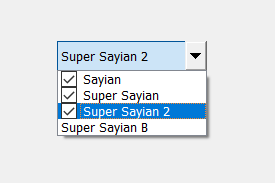PyQt5 - 带有可检查项目的组合框
在本文中,我们将看到如何制作一个具有可检查项目的组合框。默认情况下,当我们创建一个组合框时,它的项目是不可检查的,即我们可以一次选择任何一个项目,尽管我们可以通过编辑组合框类来创建这样的组合框。下面是可检查组合框的外观示意图。 
为了做到这一点,我们必须创建一个新的可编辑组合框类,它继承组合框并添加可检查组合框的新功能,下面是新类的语法
class CheckableComboBox(QComboBox):
def __init__(self, parent = None):
super(CheckableComboBox, self).__init__(parent)
self.view().pressed.connect(self.handleItemPressed)
self.setModel(QStandardItemModel(self))
def handleItemPressed(self, index):
item = self.model().itemFromIndex(index)
if item.checkState() == Qt.Checked:
item.setCheckState(Qt.Unchecked)
else:
item.setCheckState(Qt.Checked)
下面是实现——
# importing libraries
from PyQt5.QtWidgets import *
from PyQt5 import QtCore, QtGui
from PyQt5.QtGui import *
from PyQt5.QtCore import *
import sys
# new check-able combo box
class CheckableComboBox(QComboBox):
# constructor
def __init__(self, parent = None):
super(CheckableComboBox, self).__init__(parent)
self.view().pressed.connect(self.handleItemPressed)
self.setModel(QStandardItemModel(self))
# when any item get pressed
def handleItemPressed(self, index):
# getting the item
item = self.model().itemFromIndex(index)
# checking if item is checked
if item.checkState() == Qt.Checked:
# making it unchecked
item.setCheckState(Qt.Unchecked)
# if not checked
else:
# making the item checked
item.setCheckState(Qt.Checked)
class Window(QMainWindow):
def __init__(self):
super().__init__()
# setting title
self.setWindowTitle("Python ")
# setting geometry
self.setGeometry(100, 100, 600, 400)
# calling method
self.UiComponents()
# showing all the widgets
self.show()
# method for widgets
def UiComponents(self):
# creating a check-able combo box object
self.combo_box = CheckableComboBox(self)
# setting geometry of combo box
self.combo_box.setGeometry(200, 150, 150, 30)
# geek list
geek_list = ["Sayian", "Super Sayian",
"Super Sayian 2", "Super Sayian B"]
# adding list of items to combo box
self.combo_box.addItems(geek_list)
# create pyqt5 app
App = QApplication(sys.argv)
# create the instance of our Window
window = Window()
window.show()
# start the app
sys.exit(App.exec())
输出 : 